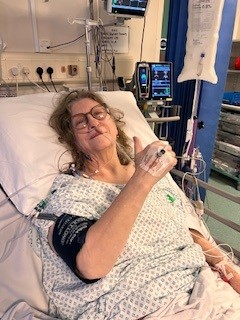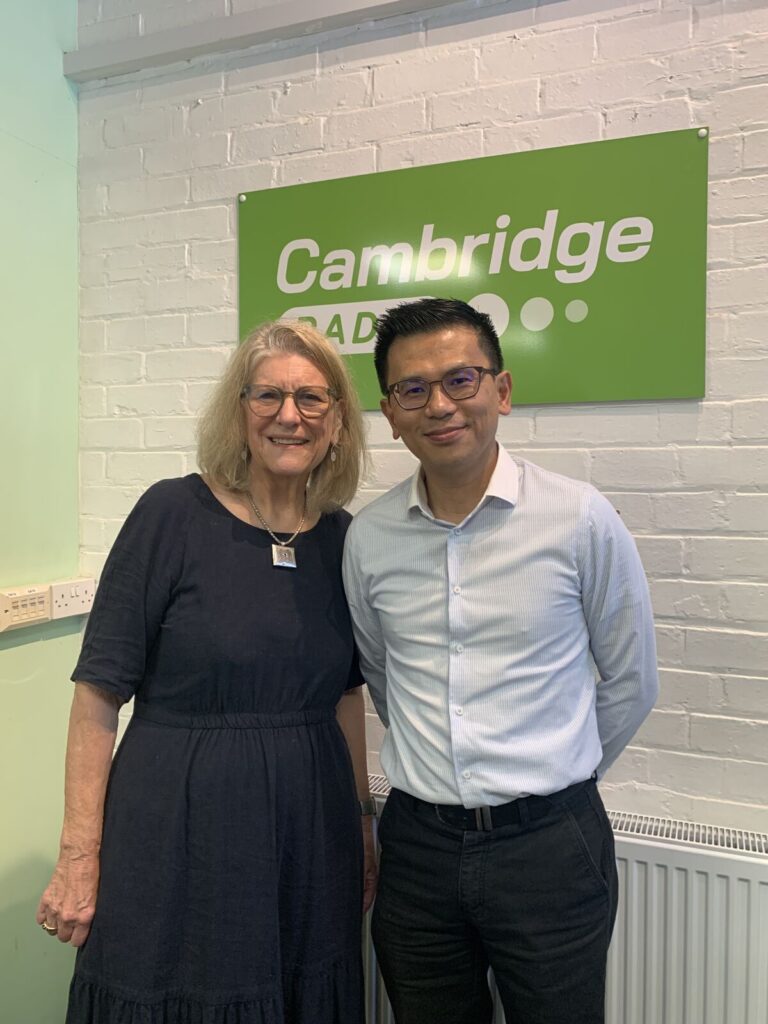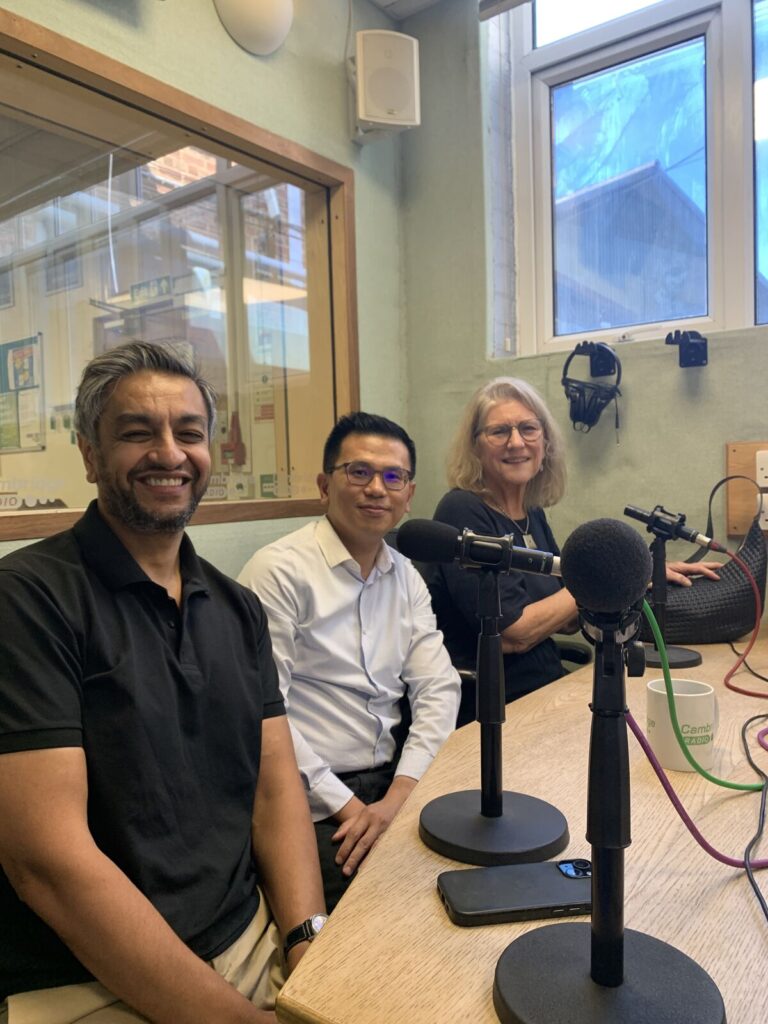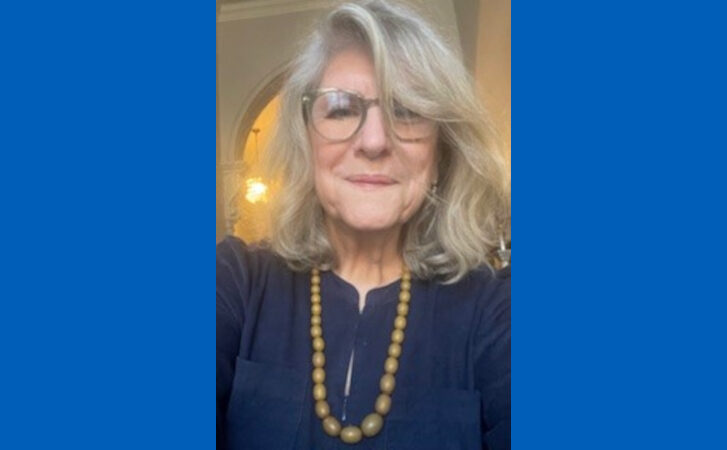Some people go through terrible times and still call themselves lucky – and 76-year-old Stephanie Hemming, from Cambridge, is one of them.
Despite undergoing robotic surgery that her surgeon told her was “very major surgery with high complexity given the proximity of the cancer to some very important vessels and structures”, Stephanie says she counts herself as lucky, for several different reasons.
Stephanie – a retired consultant now enjoying a flourishing second career as an artist, exhibiting her paintings in galleries in New York, Singapore and London – underwent major surgery in January to remove cancer from her pancreas.
However, her cancer was only discovered by chance following heart surgery six months earlier.
Stephanie, whose story features on Episode Three of ACT’s Amazing People radio show – a joint collaboration between Addenbrooke’s Charitable Trust (ACT) and Cambridge Radio – had never had any surgery in her life up to this point. She went to the doctors last year after being able to hear her heart beating in her ear. Further investigations revealed a heart murmur (arterial stenosis), and Stephanie underwent a cutting-edge operation at Papworth Hospital known as a TAVI procedure, an alternative to open heart surgery, where a new heart valve is inserted using a catheter whilst the patient is under sedation.

Shortly after her operation though, Stephanie had what she describes as a ‘strange feeling’ in her heart.
“I was at home and I got a sort of a strange feeling around my chest which I would have ignored in any other circumstances but because I’d had the heart surgery, I rung my GP and asked, ‘do I need to come and see you?’ He said, no you don’t, you need to call an ambulance.”
Stephanie was taken to hospital where tests revealed there was nothing wrong with her heart. However, further investigations later revealed she had pancreatic cancer; which was diagnosed several months later, shortly before Christmas.
“I honestly didn’t have a clue. I just had this funny kind of pain. I would have dismissed it had it not been for my heart surgery.”
Stephanie was told she had Stage 1 pancreatic cancer, a very aggressive form of cancer that is not normally picked up until much further down the line as symptoms can be easily confused with other conditions.
In her own words, Stephanie describes herself as ‘very lucky’ to have had it picked up at Stage 1 – “Bad luck to have a rotten heart but good luck that it helped pick up my pancreatic cancer diagnosis so early.”
Following the diagnosis in December, Stephanie underwent cutting-edge, robot-assisted surgery in January this year, using the da Vinci Xi Robotic Surgical System which ACT supporters donated to Addenbrooke’s following a £1.5 million public campaign, supported by the Cambridge Independent.
As the official charity for Addenbrooke’s, ACT funds high-tech equipment, specialist staff, extra comforts and vital research above and beyond what the NHS is able to provide.

Benefits of robot-assisted surgery, like Stephanie’s, include less invasive surgery with less risk of infection, faster recovery times and quicker home times for patients.
Stephanie underwent a Pancreatectomy and a Splenectomy – with 70% of her Pancreas removed, along with her Spleen as a precautionary measure.
She remembers her surgeon, Mr Siong-Seng Liau – a Consultant Hepatobiliary and Pancreatic Surgeon and Chair of the Robotic Steering Group at Addenbrooke’s – coming to see her after the operation, describing her operation as “very major surgery with high complexity given the proximity of the cancer to some very important vessels and structures.”
A few days later, Mr Liau – who hopes to see more robotic systems at Addenbrooke’s and establish the hospital as a Centre of Excellence for Robotic Surgery – told Stephanie that lab tests had revealed that the surgery had removed all traces of cancer from her body.
Stephanie says she wasn’t in any pain following surgery but said a drain, which was inserted to help drain fluid from her pancreas, was incredibly uncomfortable – and she could feel it moving ‘with every step’ she took.
Since her operation, Stephanie now has to take antibiotics on a daily basis, along with regular vaccinations, since becoming more at risk of serious infection following the removal of her spleen, which helps regulate the body’s immune system. She also has to take an artificial enzyme drug every time she eats to help her absorb nutrients from her food, since the removal of a large part of her pancreas, which helps the body digest food.
Stephanie says she has nothing but praise for both Mr Liau, her surgeon, and the robotic surgery itself.
Of Mr Liau, she says: “He manages to do what not many people can do and combine authority whilst remaining warm and engaging. I used to think, who would look forward to meeting with a surgeon? But I look forward to seeing him every time, he is just a very nice man. I can’t praise him enough.”

Stephanie says she is also incredibly lucky to live where she does in Cambridge, giving her access to what she describes as ‘cutting-edge surgery’ at both Papworth and Addenbrooke’s.
She said her robotic surgery would not have been possible a year earlier and describes her attitude towards robotic surgery as a really positive one.
“I always felt comfortable with having this surgery because I had absolute faith in Mr Liau and understood it would be his hands on the robotic arms. I was really happy that I would only have small cuts rather than a large wound which would have taken much longer to heal and would have kept me in hospital longer.”
“It’s reassuring to know that it’s the surgeon you trust using the same skills as if he was operating in the conventional way, but with even more precision. It was that precision which allowed him to remove a tumour which he told me was very difficult to access.”
Asked how she felt about robotic surgery overall, Stephanie added: “I see this as a wonderful enhancement of the surgeon’s already considerable skills. The technology is brilliant, but you still need a brilliant surgeon to do it. That is my view of robotic surgery.”
Read more about robotic surgery and listen to the ACT’s Amazing People podcast.

